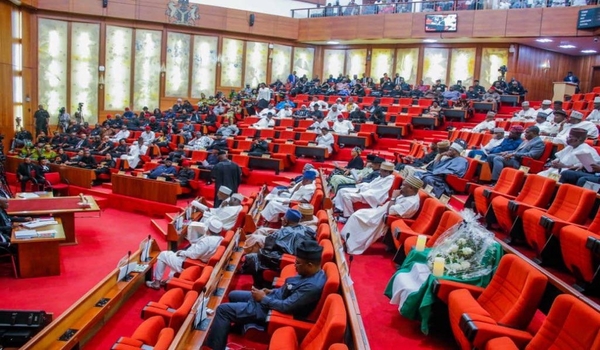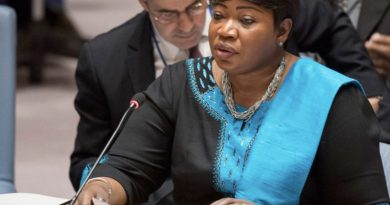Again, Senate holds closed-door session, postpones action on Electoral Act Amendment Bill till January
The Senate on Wednesday after about thirty minutes of closed session to deliberate on the Electoral Act Amendment Bill rejected by President Muhammadu Buhari resolved to consult with the House of Representatives in January when both chambers will be in session.
According to the Senate President, Ahmad Lawan, the House of Representatives has gone on recess and the constitutional provision is for both chambers to jointly take appropriate action.
He added that the Senators also resolved to consult with their constituents during the Christmas recess before the lawmakers reconvene in January.
Lawan further added that constituents have a role to play as major stakeholders in the business of law-making by the National Assembly.
Senators resumed plenary on Wednesday with another closed-door session discussing President Muhamadu Buhari’s veto on the Electoral Act Amendment bill. The closed-door session was held for a few minutes.
At the end of the session, Senate President Ahmad Lawan said the lawmakers discussed President Buhari’s refusal to sign the Electoral Act Amendment Bill into law.
He added that the Senators have decided to wait for their colleagues in the House of Representatives to resume before taking any action as whatever step they need to take will involve the House of Representatives.
He also said the Senate will consult with their constituents and other stakeholders during the Christmas and New Year break.
Meanwhile, members of the House of Representatives are currently on holiday and their sitting has been adjourned till January next year.
Speaker of the House, Femi Gbajabiamila in a speech to the lawmakers on Tuesday in Abuja to mark the adjournment of the House for the Christmas and New Year break said the House will address the matter in January 2022.
Although the situation in the House of Representatives, was not as heated as the Senate, the House leadership said, while the bill might not have received presidential assent, it was within the responsibility of the parliament to decide the best way forward, adding that it would resume efforts to reform the electoral system next year.
Gbajabiamila explained that the time was short to address the sensitive issue at hand in haste because members were set to proceed on break, and they must pass other important bills such as the 2022 Appropriation Bill and the Finance Bill before doing so.
President Buhari had withheld his assent to the bill citing the cost of conducting direct primary elections, security challenges, and possible manipulation of electoral processes by political actors as part of the reasons.
“In the premise of the above, I hereby signify to the National Assembly that I am constrained to withhold assent to the Electoral Act (Amendment) Bill 2021, in line with the provisions of Section 58(1) & (4) of the 1999 Constitution (as amended). It is my considered position that the political parties should be allowed to freely exercise the right of choice in deciding which of direct or indirect primaries to adopt in the conduct of their primary elections as their respective realities may permit.”
The National Assembly on Tuesday read President Buhari’s letter at both the Senate and House of Representatives plenary sessions.
This is the second time the president would be withholding assent to the electoral bill, the first being during the Eighth National Assembly in 2018 when he said the passage of the bill by the then National Assembly was too close to the 2019 general election.
Two closed-door sessions held at yesterday’s plenary were said to be inconclusive, as senators, reportedly, threatened to invoke the provisions of the 1999 Constitution (as amended) to veto the president’s position on Wednesday’s plenary.
And while Governors Kayode Fayemi of Ekiti and Samuel Ortom of Benue State lauded the President’s decision, civil society organisations (CSOs) and some federal lawmakers were clearly disappointed.
A federal lawmaker Senator George Sekibo confirmed to Channels Television on Tuesday that some senators are planning to veto President Muhammadu Buhari on the electoral act amendment bill.
He said they have compiled 73 signatures to veto the President. The 109-member Senate will require a two-thirds majority to veto the bill into law.
Meanwhile, the immediate past President of the Senate, Dr. Bukola Saraki, has challenged the National Assembly to be quick in its next line of action following President Muhammadu Buhari’s refusal to sign the Electoral Act Amendment Bill.
In a statement on Wednesday, he proposed two critical decisions the lawmakers should make to ensure the bill becomes a law by January.
“Now that Mr. President has conveyed his decision to decline assent to the Electoral Act [amendment] Bill, I am sure that I speak on behalf of millions of Nigerians in urging the National Assembly to act fast. This is because we cannot sit back and allow one contentious clause to throw away all the positives in the proposed Electoral Act [amendment] Bill.
“At this point, two options are open to the National Assembly. They either veto the president’s decline of assent or remove the contentious provision on direct primaries and send it back to the President for his assent.
“Whichever option, our legislators choose, can be accomplished in the shortest possible time. We could have a new electoral law in January 2022.”
“This proposed electoral law is expected to reassure the youths, many of whom steer clear of the political process because they have no confidence in the system. They believe the system is usually rigged and compromised,” the former Senate President said.
“One way to bring this active demography into the political system is to enact a new law that will give them hope in our nation. This Electoral Act [Amendment] Bill serves that purpose.
“This is why, as the representatives of the Nigerian people, the National Assembly must take a decision in the interest of our nation and its long-term democracy. The option of not doing anything after the refusal of the assent by the President is not an option.”




